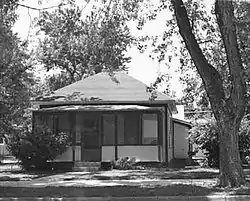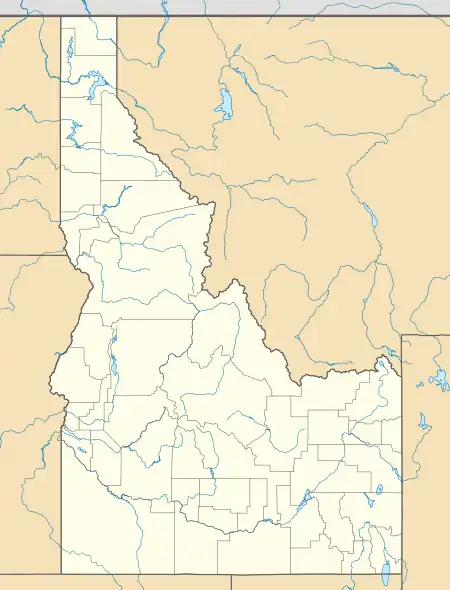Marion Allsup House | |
 The Marion Allsup House in 1981 | |
  | |
| Location | 1601 N. 10th, Boise, Idaho |
|---|---|
| Coordinates | 43°37′43″N 116°11′57″W / 43.62861°N 116.19917°W |
| Area | less than one acre |
| Built | 1901 |
| Architect | Tourtellotte, John E. & Company |
| Architectural style | Neoclassical, Colonial Revival |
| MPS | Tourtellotte and Hummel Architecture TR |
| NRHP reference No. | 82000178[1] |
| Added to NRHP | November 17, 1982 |
The Marion Allsup House in Boise, Idaho, was a 1-story, 5-room cottage designed by Tourtellotte & Co. and constructed in 1901. The house featured Colonial Revival or Neoclassical details, including narrow shiplap siding, a cross facade porch, and a pyramid roof. The Allsup House was the least elaborate design of all surviving houses from the Tourtellotte thematic group. The house was added to the National Register of Historic Places (NRHP) in 1982.[2][3] The Allsup House either was demolished or renovated after its nomination and listing on the NRHP, and the current 2-story house at the site retains no similarity to the modest 1901 design drawn by Tourtellotte & Co.
Marion F. Allsup was a cement and plaster contractor who worked on the Idanha Hotel, the Belgravia Building, and St. Michael's Cathedral.[4][5][6] By 1917 he may have moved to Flagstaff, Arizona.[7]
References
- ↑ "National Register Information System". National Register of Historic Places. National Park Service. November 2, 2013.
- ↑ "National Register of Historic Places Inventory/Nomination: Marion Allsup House". National Park Service. Retrieved March 27, 2019. With accompanying pictures
- ↑ "Splendid Record Made by Boise". Idaho Statesman. Boise, Idaho. January 1, 1901. p. 9.
- ↑ "The work of plastering the Idanha hotel...". Idaho Statesman. Boise, Idaho. August 28, 1900. p. 6.
- ↑ "Dubois Flats Bring $28,050 at Auction". Idaho Statesman. Boise, Idaho. February 3, 1906. p. 8.
- ↑ "Episcopal Church". Idaho Statesman. Boise, Idaho. April 16, 1902. p. 5.
- ↑ "Instruments Allowed Recorded by County Recorder in His Office". The Coconino Sun. Flagstaff, Arizona. January 12, 1917. p. 3. Retrieved March 27, 2019.